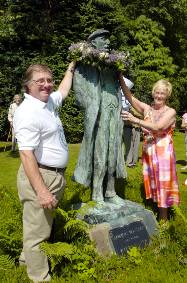Yorkshire Day draws 3,500
Date published: 28 July 2008

Gilbert Symes and Parish council Chair Pat Lord place a wreath on the statue of poet Ammon Wrigley
Yorkshire Day in Saddleworth is proving one of the district’s most popular events — even though the local government boundaries changed 30 years ago placing it firmly on the Lancashire side.
More than 3,500 people attended celebrations for Yorkshire yesterday in Uppermill.
And organisers were quick to pour cold water on the assertion that 30 years after Oldham and Saddleworth were absorbed into Greater Manchester, Yorkshire was no longer relevant to the area.
One of the organisers, Brenda Cockayne, said: “You cannot change the original country boundaries which state that Saddleworth lies within Yorkshire.
“We are still in the old Yorkshire county and the popularity of this event demonstrates the level of interest.”
Others had a different view. Underwriter Chris Hall (29), of Grasscroft, said the need for a White Rose Day was beyond him.
Mike Rooke, of Greenfield and Grasscroft Residents’ Association, said campaigning to create some South Pennine Authority was a waste of energy.
Yet parish councillor Ken Hulme said Saddleworth was and always would be Yorkshire.
Roy Bardsley, secretary of the Saddleworth White Rose Society said: “Saddleworth is still in Yorkshire. It was never moved out. Oldham and Greater Manchester were only there as far as Saddleworth was concerned for administrative purposes.”
At Yorkshire Day yesterday, the chairman of Saddleworth Parish Council — which gives its address as Uppermill, Yorkshire — Councillor Pat Lord placed a wreath around the statue of local poet Ammon Wrigley. Local personality Gilbert Symes recited some local poems and a procession where the White Rose flag was flown was staged along High Street with music from Dobcross Silver Band.
The fun continued in the afternoon on King George V Playing Fields, where there were specialist food stalls, cheeses and home-made ice-cream on a hot afternoon. Teas were served from the Saddleworth Rose narrow boat and the Saddleworth White Rose Society stand.
The English Civil War Group, from Dewsbury, displayed period costume, weaponry and wool spinning. There were also exhibitrions of country crafts, including dry-stone walling, quilting and rug-making, sheep shearing, dairy goat milking and Shetland pony riding.
Most Viewed News Stories
- 1Head confident that Saddleworth School is still 'heading in the right direction' despite 'Requires...
- 2Two Oldham students study at both Oxford AND Cambridge
- 3No trams to run between Oldham and Rochdale on Sunday
- 4Saddleworth will steam to success again this year
- 5Get signed up for the Dr Kershaw's Golf Day 2024




